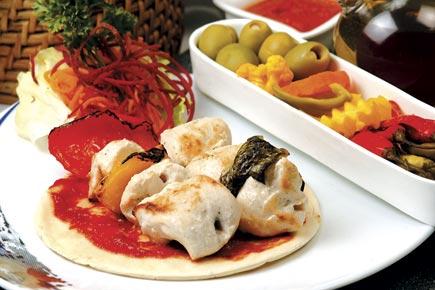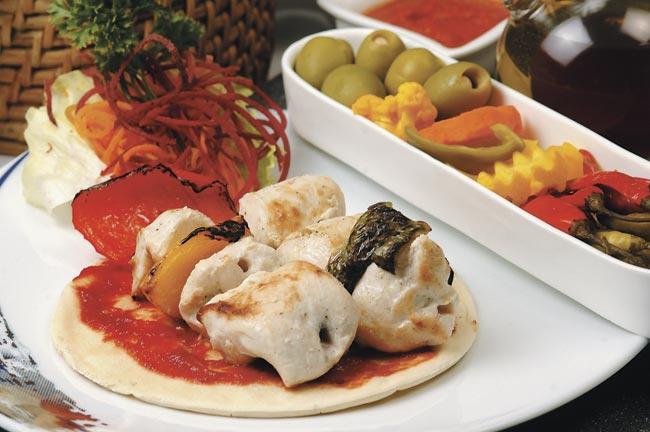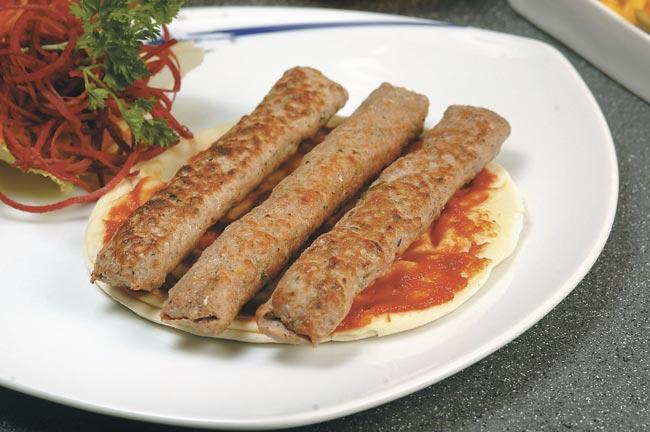We try out Taj Mahal Palace hotel's restaurant, Souk and Andheri restaurant, Royal Flavours. Here's the verdict...

For the relatively uninitiated, to think of iftar is to think of Nalli Nihari at a Mohammad Ali road eatery chunks of meat swirling in oil and celebration. Then, there’s always the aroma of mutton biryani wafting out from another, trumped, perhaps, only by the sizzle of a malpua in a blackened vessel nearby.
ADVERTISEMENT

Turkish spices and a dessert from the Alexandrian empire await patrons at Souk
It is with these intense tastes and images that we enter Souk, Taj Mahal Palace hotel’s rooftop restaurant for the iftar feast. Can this upscale meal of the Middle Eastern dishes outshine the street camaraderie or the warmth of a feast shared at home?

Their Sheesh Taouk (top) and Kebab Meshwi (above) have subtle, balanced flavours
As is customary, we are served assorted nuts and crudités believers break the fast with. Next comes a refreshing, frothy drink called Laban. Also called Ayran, this beverage has cold, salted yogurt flavoured with ample garlic and mint.
We move to the shorbas and grills. The Shorba Harira, a Moroccan favourite, has a tomato base with chunks of lamb. It is not remarkable, and we definitely prefer the Shorba dijaj bil shaiyreya, which has chicken, cinnamon, cardamom and bay leaves.
This shorba traditionally uses strips of chicken not chunks which is a rather unexpected, pleasant surprise. Its taste comes second only to the vegetarian (yes, vegetarian) Ashe Reshte, made of lentils carrot, zucchini and parsley. Sipping it makes you want to hatch devious plans to rob the large (imagined) vats of the shorba simmering in the kitchen. Be warned.
We slice into Samak Meshwie, a juicy basa grilled and flavoured ever so delicately with Turkish spices. The produce is fresh and the aftertaste just as memorable as the first bite, we notice. The traditional Turkish Kebab Joojeh, which is marinated chicken, skewered and grilled, and Lahm Meshwie, which is pieces of lamb cooked in the same style, make for memorable treats, too.
The Jibne Meshwie, we find to our mild fascination, are char-grilled cheese kebabs made with pine nuts and Turkish spices. The pine nuts could be overwhelming if you haven’t, say, spent all your childhood secretly nibbling on them like someone we know has.
Just when one of us swears that not one more portion of the feast ahead will find home in her, our server arrives with Roze Kousharie (Egyptian rice with lentil and chick peas), Makboush al Dijaj (a rice preparation with chicken) and a stew called Tharid al Khodra.
While the former rice dish has the warmth of comfort home food, the latter is a rich preparation we know we will crave for a day or two. The stew is just about average. The Spanakos Menemen is a mix of creamy spinach, baby potatoes, and feta cheese in potato pancake. This dish is from Istanbul is light yet creamy and indulgent enough to savour on cool, rainy nights.
The entrées maintain the tradition and taste of this meal. Dizzying aromas, deep red and ochre colours are all right, but the subtlety of the flavours in this Middle East feast grows on us. Dessert is next, and, by now, we know better than to expect the ubiquitous malpua and phirni. The table is laden with Umm Ali, a delicious, classic Turkish delicacy made from baked filo pastry and reduced milk.
However, what bowl us over are the kinafi jibni and a dessert the chef says is the legacy of the Alexandrian empire. The former has vermicelli (deep-fried, street-style) heavily-sprinkled around a core of ricotta cheese. The latter, too, has ricotta cheese at its heart, but is wrapped with a soft casing of pancake and topped with crushed pistas.
The baklawa, with its ever-so-flaky pastry conceals the tastes of Turkey within. This feast we would not waste on comparisons we had on our mind earlier. What Souk offers is a flavour of all things faraway. Those who forever travel in their heads will know just how voyages taste.
Price: Rs 1,295 (plus tax) per person; Rs 1,495 (plus tax) per person served between 7.30 pm-8.30 pm till the end of Ramzan
 Subscribe today by clicking the link and stay updated with the latest news!" Click here!
Subscribe today by clicking the link and stay updated with the latest news!" Click here!






